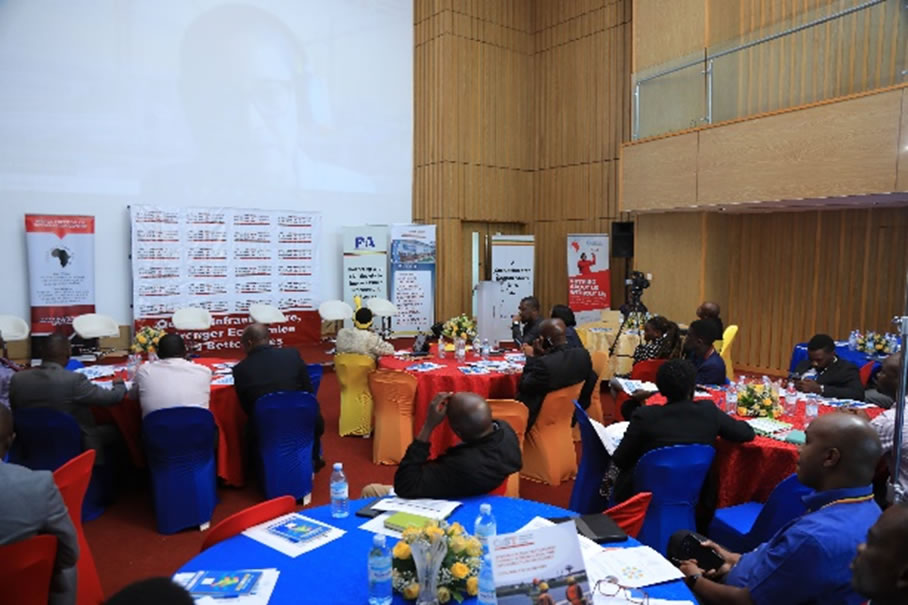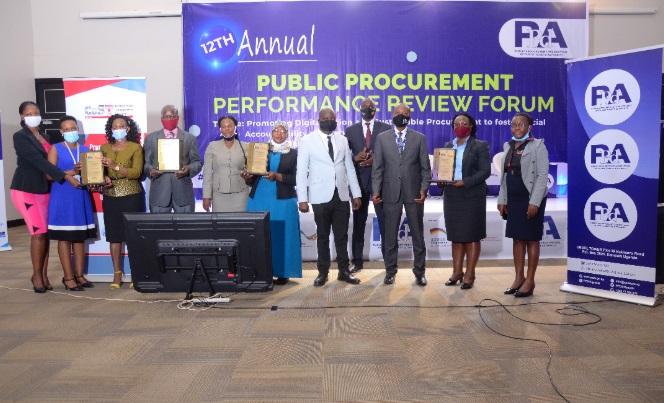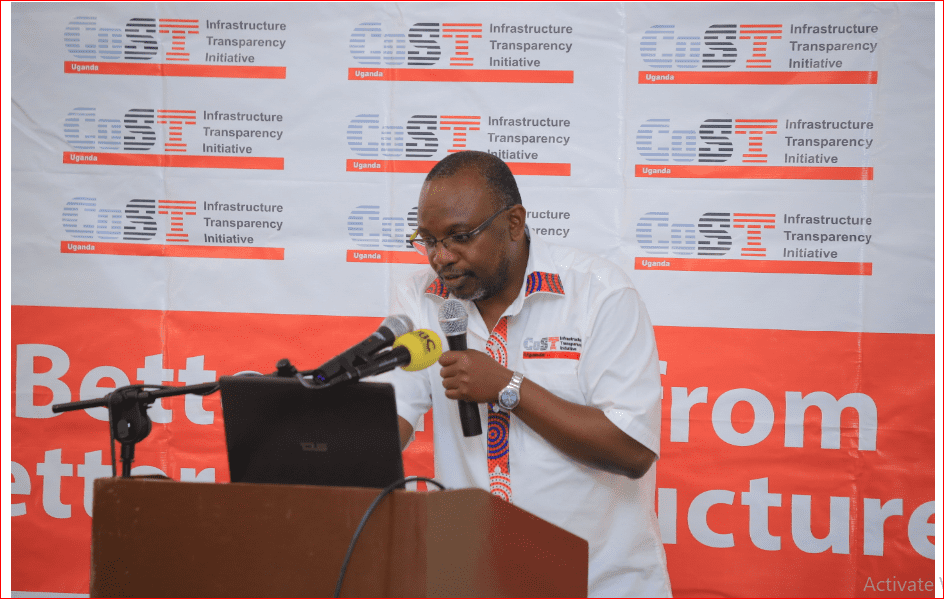
The government of Uganda through PPDA committed to increasing Infrastructure Procurement Transparency through putting in place Fair Business Practices between Government and the Private Sector (Contractors and Consulting Engineers).
This commitment was made during a high-level infrastructure procurement transparency engagement organized by CoST Uganda Chapter, in a partnership, it’s Champion Ministry of Works and Transport and PPDA on the 25th June 2020 at the Kampala Protea hotel. The meeting brought together 34 (25 Male, 9 Female) stakeholders from Government, Private sector and Civil Society.
The high-level meeting was anchored on the findings and recommendations from the analysis on the Government Procurement Portal’s infrastructure disclosed data against the CoST Infrastructure Data Standard. It created a platform for the private sector to engage with Government on issues affecting fair business practices in the public infrastructure procurement processes, in a bid to “increase competition in doing business with government agencies”
In his remarks and response to the CoST findings, Mr. Benson Tumuramye, the Executive Director, Public Procurement and Disposal of Public Assets Authority (PPDA) emphasized that “to avert the challenges affecting private sector’s full participation, and to enhance fair business practices; a discussion on the amendment of the reservation guidelines i.e. (local contractors capacity building, disadvantages citizens, SMEs) is ongoing” in addition to their commitments, PPDA committed to reviewing provide clarity on the local content law and to promote fair business practices.
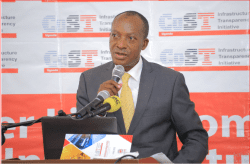
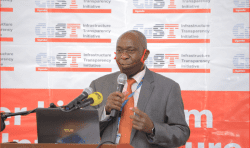
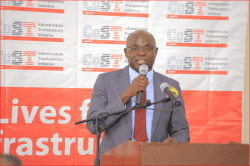
Left_Right: Mr. Benson Tumuramye, Executive Director, PPDA; Mr. David Kiyingi, Commissioner, Procurement Policy and Planning Department, Dr. Levi Kabagambe, Board Member, PPDA.
Ministry of Finance, Planning, and Economic Development committed to fast track the establishment of the construction industry fund, and provide additional funding to PPDA for capacity building and performance monitoring; and Ministry of Works and Transport committed to disclosing information, and monitor the performance of the agencies under the works and transport sector.
The private sector (contractors and consulting engineers) associations expressed appreciation for the platform to raise concerns and present their requests to Government. Some of the issues presented include; the need for a construction industry development fund, the private sector further requested that PPDA clarifies on the local content law provisions, this resulted from the data analysis finding on 99.4% companies were Ugandan and yet, the private sector in Uganda felt they had not been engaged to this level to take up government projects. In addition, the private sector called for an interpretation of “Resident provider” in the local content law, a fair determination of bid qualification requirements of annual turnover and works of similar nature of previously executed projects (under the reservation threshold), develop a project-specific national provider development plan to improve the national provider performance in the identified development areas which allocates resources and monitors progress in relation to improved performance; For instance, Initiation of the 10-year strategic program with a total of 1,850km as an Affirmative Road Development Pilot Projects to deliberately address the critical need for domestic paved roads construction providers, and impact to stimulate further investment in equipment and human resource assets for domestic contractors; categorization of projects done by consulting engineers and contractors on the disclosed data through the GPP and the E-GP.
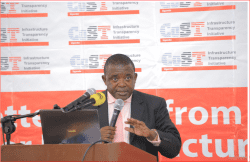
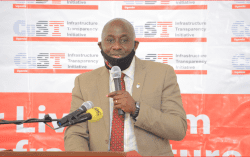
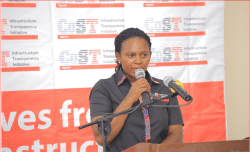
Left_Right Eng. Samson Bagonza, Engineer In Chief, Ministry of Works and Transport; Eng. Dr. Patrick Rusongoza, Head- State House Infrastructure Monitoring Unit & Senior Presidential Advisor on Infrastructure, Eng. Betty Nakamya, UACE Chairperson
On their end, CoST Uganda, encouraged PPDA to adopt the Infrastructure Data Standard (IDS) and OC4IDS indicators for the disclosure of project information through the upgrade of the E-GP and the GPP to consider the OC4IDS extension; to harmonize project and contract disclosure templates to enhance information sharing on planned projects, implementation status, expected outputs, funding details, and costs; to develop and implement a policy on the management of procurement data to coordinate, facilitate, and monitor data capture, analysis, storage, and archiving and the sharing of data and information among authorized stakeholders; to review the current guidelines on reservation schemes to promote Local Content, and commission a study to establish factors that inhibit the private sector from fully participating in public infrastructure procurement. This could be done in partnership with the CoST Uganda Multi-Stakeholder Group.
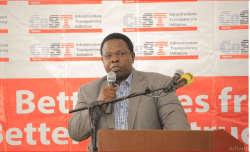
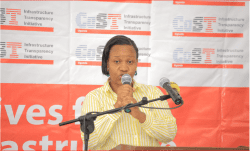
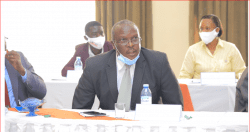
CoST Uganda Multi-Stakeholder Group Members at the High-level meeting;
During the engagement, stakeholders called for continued analysis of procurement information on infrastructure projects and also asked CoST Uganda to engage the stakeholders to discuss the indicators for the analysis. The private sector was urged to promote ethical practices, gain confidence in winning contracts.
We need an interpretation of the Local Content law, the analysis report reveals that at least 99% local firms are benefiting from infrastructure procurements in the last three years; this confuses as the data disclosed does not reveal who of these 99% firms are locally owned by Ugandans and those that are foreign. It is important that this data is disclosed to enable stakeholders to access information to inform how to engage effectively and efficiently. These engagements on fair business practices are very important and should be annually recognized, the analysis should also be taken up as an annual event, the private sector expressed during the high-level engagement.
“Government has been the first to know that local firms can work, when COVID-19 came, people realized that government can do things. There is a need to sit together and gather data on how both local and foreign firms are engaging in public infrastructure procurement processes. The problem is that enemies of Uganda are Ugandans themselves most people do not engage with integrity and do not want to see good things being done, to the extent, that they will frustrate good things being done” Dr. Levi Kabagambe, Board Member, PPDA.
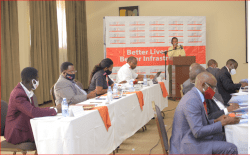
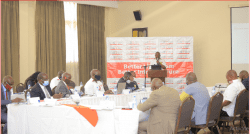
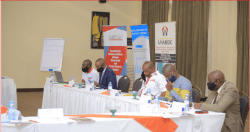
Participants at the High-Level engagement


